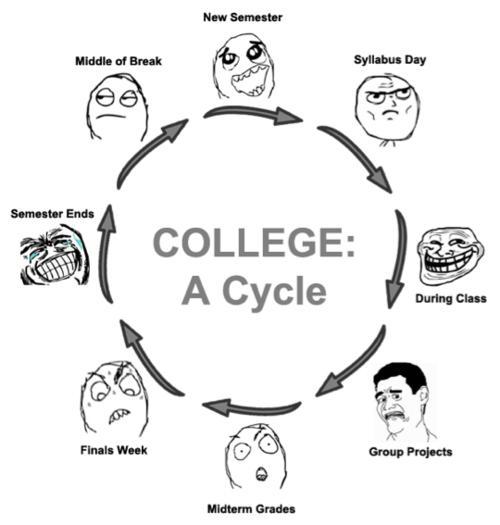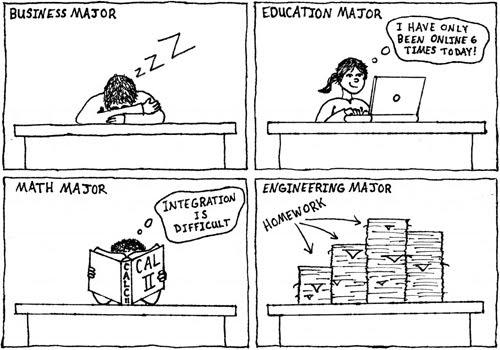homework
Spring 2017 ENG 2320 syllabus Coyle 7
American Academic Culture: ENG 2320 sec 02 Spring 2017 CRN: 21035Instructor: Mary Coyle Time: T/Th 9:30-10:50
Office: 486 Millett Course location: 286 Millett Hall Office hours: T/Th 12:30-1:30
Eng. Dept: 775-3136 and by appointment.
Email: [email protected]
Course Description:American Academic Culture (ENG 2320) is a 3.0 credit hour course intended to promote the development and engagement of international undergraduate students in their academic studies at Wright State University. The course will expose students to the unique cultural norms within American higher education. Students will critically analyze the social, political, and economic factors which have influenced the development and continuous evolution of these norms. American Academic Culture prepares international students for challenges they may face both on, and off, campus. It equips students with the knowledge and skills they need to be successful--both academically and personally--while studying in the U.S.
Course Objectives:Build students’ understanding of the origins of American cultural norms through critical analysis of the various socioeconomic and political factors associated with the establishment and development of these norms
Increase students’ awareness of, and appreciation for, the significant diversity found in various aspects of American universities. Ideally, this will increase students’ capacity to engage in the campus community
Empower students to critically evaluate university culture in America and compare it to other global norms
American Academic Culture ENG 2320 is a designated Wright State Core course. The requirements for this course (reading, writing, and class participation) and the selection of required texts are aimed at achieving the following University learning objectives:
communicate effectively
evaluate arguments and evidence critically
apply the methods of inquiry of the arts and humanities
demonstrate global and intercultural competence
demonstrate understanding of contemporary social and ethical issues
participate in democratic society as informed and civically engaged citizens
In addition, the course achieves the following Wright State Core learning outcomes associated with the Global Traditions Element:
Critically describe some of the political, social, or economic systems; historical, cultural, or spiritual traditions; and/or technological innovations around the world
Demonstrate an awareness of the diversity of people or traditions in our world in ways that promote effective engagement, both locally and globally
Use political, social, economic, historical, cultural, spiritual or technological knowledge to evaluate contemporary issues
Cultures in Contrast: Student Life at U.S. Colleges and Universities. 2nd edition. Myra Shulman. The University of Michigan Press, 2009.
Readings and handouts posted on Pilot. (Be prepared to print).
Suggested Materials:
Pencils, pens, highlighters, and paper
A binder, or pocket folder to keep handouts and assignments organized
Exams: 30 %
There will be three exams including one during finals’ week. (Grammar and format will not be graded).
Homework Assignments: 20 %
Assignments in Cultures in Contrast as well as other short readings, discussion board participation, and Pilot quizzes. (Grammar and format will not be graded).
Group Presentations: 15%
Each group of students will investigate and visit an organization on campus and present their findings to the class. Alternately, with my permission, a group may inform us about a topic pertinent to our class curriculum. (Grammar and format will be graded).
Journal Entries: 15%
Students will keep a journal about their experiences with cultural differences and interactions with native speakers--both on and off campus. I will assign a writing prompt every other week. Additional topics will be assigned throughout the semester. Journal entries will be submitted every other week. (Grammar and format will not be graded).
Campus Event Summary and Reaction: 10%
Students must attend a campus event and write a 2+ page essay describing the event and their reaction to it. (Grammar and format will be graded).
Participation: 10%
Students will be asked to work in groups, do in-class activities, participate in discussions, and answer questions.
A = 90 – 100%
B = 80 – 89%
C = 70 – 79%
D = 60 – 69%
F = Below 60%
Late work may not be accepted, or may result in a lower grade.
Attendance:
I expect you to be in class, on time, and prepared to participate for each class session. You are allowed two absences without consequence; I do, however, expect notification from you regarding the reason for your absence. In the event of an absence, I expect you to make-up missed work. Punctuality counts: tardiness is nearly as egregious a sin as absence. Be advised that I may subtract points from your grade for habitual tardiness or for leaving early. Be engaged in class, and make sure that I make note of your attendance. I record attendance on Pilot, and you can check your attendance status. It is up to you to protect your interest and ensure that you have not been recorded absent, erroneously. Missing more than 4 classes may cause you to fail this course.
Communication:
You must have access to your Wright State Wings e-mail account. From time to time, I will communicate to the class through e-mail; be sure to check your WSU e-mail account daily. Also, exchange phone numbers with someone else in class in case you’re unable to access your e-mail and need to find out information about class.
Office of Disability Services (ODS):
If you think you need an accommodation (such as extra time to complete an assignment) because of a disability, I can work with you and the ODS to create paths for success in this class. You may contact the ODS at: 937-775-5680 or [email protected].
University Writing Center:
It’s staffed by trained peer writing coaches. I urge you to take advantage of this service. Attendance at required Writing Center coaching sessions will count toward the attendance requirement. If I send you to the writing center, I expect you to have your writing coach notify me that you have visited the center.
For more information on the Writing Center, go to http://www.wright.edu/academics/writingctr/about/services.html
Student Technology Assistance Center (STAC):
If you want to create texts in digital media (video, Web pages, musical production, imaging, prezi presentations, podcasting), the STAC in Dunbar library offers trained student mentors, equipment, and storage. For more assistance, go to
http://www.libraries.wright.edu/services/stac/
Academic Integrity:
In American universities, academic integrity is important. Plagiarism--turning in work that you did not create--has serious consequences: you could fail the assignment, fail the course, and possibly be expelled from the university. In addition, in general, I do not accept self-plagiarism—turning in work you have also submitted for another class. See the WSU Student Code of Conduct at http://www.wright.edu/students/judicial/integrity.html for more information about academic integrity and plagiarism.
Classroom Behavior and Etiquette:
Inappropriate classroom behavior includes: doing work for other classes, talking on a cell phone, texting, surfing the Net, checking Facebook, snapchat, Instagram, Twitter, and writing e-mail. Blatant or repeat violators may be considered absent for the day. Please remember to practice mutual respect and consideration in your electronic communication with me and your peers as well as in your in-class engagement and participation.
Be mindful that I will ask you to leave class if your behavior disrupts or interferes with the work of the class. The university defines disruptive behavior as “an action or combination of actions by an individual that unreasonably interferes with, hinders, obstructs, or prevents the right of others to freely participate in its activity, program, or service, including behavior that may prevent faculty and staff members from carrying out their professional responsibilities.” For more information, please see “Managing Inappropriate Student Behavior: A Guide for Faculty and Staff” at http://www.wright.edu/students/judicial/inappropriatestudentconduct.pdf
There are many different cultures in our class, and we all share some cultural attitudes about what constitutes polite behavior. Nevertheless, we also have different opinions about the best ways to show mutual respect and consideration to each other. Here are several ways to show respect:
Try not to interrupt. If your teacher or a classmate is speaking, wait until he/she is finished to begin talking.
Turn your cell phone to silent or off before class begins. Answering a ringing cell phone, taking a call, or texting during class can be disruptive and disrespectful.
Come to class on time so that you do not interrupt the lesson or discussion that may be going on.
Speak in English. This will help you learn English as well as make sure that everyone in class can understand what you are saying.
Extra Credit:
I will award extra credit for each time you attend the UCIE Convo Club up to five visits. See Pilot for more information on this resource.
This syllabus is subject to change. I will not, however, change it unless I deem the change useful to your successful completion of this course.


Tentative Agenda
Note: We will have visits from various guest speakers throughout the semester. These visits may affect out agenda. Always check the homework and assignments folders on Pilot for up-to-date deadlines.
| Week | Topic |
| Week 1 | Introduction, Cultural Differences, Culture Shock, Syllabus Read: Culture Shock C in C Chapter 12 “Social Adjustment: Culture Shock.” |
| Week 2 | Culture Shock cont’d. Time Management Read: Time Management C in C Chapter 4 “Time Management: Punctuality.” |
| Week 3 | Time Management cont’d. Punctuality, Deadlines, Student /Teacher Interactions, etc. Read: C in C Chapter 1 “Academic Motivation: Miscommunication.” Communication Outside the Classroom (Office Hours/Email) |
| Week 4 | Classroom Skills (Taking Notes/Giving Presentations). Review for Exam #1 |
| Week 5 | Exam # 1 (C in C Chapters 12, 4, 1) |
| Week 6 | Academic Integrity / Plagiarism. Read: C in C Chapter 9 “Academic Integrity: Plagiarism.” |
| Week 7 | Academic Integrity / Plagiarism cont’d. Read: C in C Chapter 2 “Group Learning: Unethical Behavior.” |
| Spring Break! | |
| Week 8 | Health & Safety Read: C in C Chapter 11 “Peer Pressure: Binge Drinking” |
| Week 9 | Review for Exam #2 |
| Week 10 | Exam # 2 (C in C Chapters 9, 2, 11) |
| Week 11 | Social Issues on Campus Read: C in C Chapter 7 “Religious Beliefs: Discrimination” |
| Week 12 | Social Issues on Campus cont’d. Read: C in C Chapter 10 “Personal Relationships: Racism and Prejudice” |
| Week 13 | Group Presentations |
| Week 14 | Group Presentations / Catch up / Course Evaluations Wrap Up |
| Final Exam Week | The third (and last) exam for the course will take place during our assigned final exam time. Exam # 3 (C in C Chapters 7 &10) |



